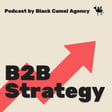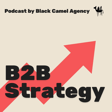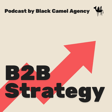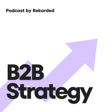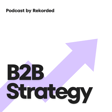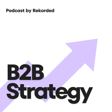Become a Creator today!Start creating today - Share your story with the world!
Start for free
00:00:00
00:00:01

03: How To Start Your Company's LinkedIn Evangelist Program with Dan Sanchez
You know how important LinkedIn content is for generating demand for your B2B solution. But how can we do it at a company-wide level? What are the steps to take?
Transcript
Introduction to B2B Strategy and Guest: Dan Sanchez
00:00:00
Speaker
Welcome to the B2B Strategy Podcast, your roundtable of B2B strategists guiding you in every decision you make in growing your business. Today we'll be talking to Dan Sanchez. Dan is an expert on building audiences for B2B brands. For several years he worked at Sweetfish, helping produce industry leading podcasts, as well as being the co-host of their very own B2B Growth Podcast, which is one of the highest ranked marketing podcasts on Apple Podcasts. As he states in his LinkedIn profile cover, instead of paying or begging to get in front of someone else's audience, you should build your own and he teaches you how.
Value of LinkedIn Content for B2B Brands
00:00:31
Speaker
B2B brands are beginning to realize the benefits of content in general, but more specifically LinkedIn content. The platform has their audience and they recognize there's a lot of opportunity there. And so one question that's asked naturally, how do we maximize the return on creating LinkedIn content for our company? And one way which has proven to have lots of success is LinkedIn evangelism. Dan, for those in the audience that aren't too familiar with the concept, could you explain a little bit more what that is?
What is LinkedIn Evangelism?
00:00:54
Speaker
LinkedIn evangelism is when you take personal brands rather than the company page or profile, and then you talk about the company through those personal brands. Sometimes it can just be one brand, it could be a hired voice, like people have had evangelists for their company for decades now.
00:01:09
Speaker
I like to give a guy Kowalski, you know, who was an evangelist for Apple and then for Google and for multiple other brands now. He was titled evangelist. He would go out and do speaking events on behalf of the company and kind of get the word out there in different ways. LinkedIn evangelist is similar, but it's just focusing on LinkedIn. And it could be your CEO, a subject matter expert, or a ton of people in your company. So that's kind of what the term means generally.
Sweet Fish's Shift to LinkedIn Evangelism
00:01:35
Speaker
And so you guys have done this at Sweetfish. Could you explain a little bit more why you guys decided to do that? You know, it's funny. We ran into an issue when 2020 hit and the pandemic started shutting everybody down. And it's funny because it was great for us because we were, you know, we were doing podcasting for B2B brands.
00:01:53
Speaker
And so a lot of people are like, oh crap, we can't do events anymore in person. We should do something digital. What's the digital equivalent of events? Podcasts. So that was really great. Unfortunately, we also lost a whole product line we called collective podcast where we would set up a podcast that was ours. And then we would charge for space on the podcast and we would promote it and everybody would promote it collectively, but we would have like, we charged to be a host on the podcast.
00:02:17
Speaker
So we had a number of people already signed up for this and we lost all those customers Because people were getting laid off and though that like the host of the that was Championing this this thing with us would lose their jobs and therefore they wouldn't renew the contract So we lost all this income coming in. We had a whole team to support that was doing nothing but
00:02:36
Speaker
you know, taking their, their podcast and make it into the clips, the social content and repurposing it. So we're like, Oh, shoot, well, traditional shows are taking off, but we have this whole team just built to repurpose. It's a couple couple people. And so James had the brilliant idea of like, Hey, why don't we just do it for ourselves, just on LinkedIn.
Launching Sweet Fish's Evangelism Program
00:02:55
Speaker
And so that was the beginning of what became our evangelist program. He pulled in just a few of us on the senior leadership team, where we're just going to blow up our personal brands. James already had a presence on LinkedIn.
00:03:03
Speaker
started our top sales guy. And I kind of came in as the third, like spoke in the wheel. And we had a team helping us create content. Now when I say create content for us, you're talking like four or five posts a week. In good posts, like they would come in and do this stuff that's not hard to do as a solo creator, like create infographics, create fun memes, think about how to rehash what I've said elsewhere and like package it up in a new way. Maybe even make some video clips from past podcast episodes.
00:03:33
Speaker
I was still, and I was still, and all of us were creating content on top of this in order to get things going. So the three of us really hit it together because what I've, and I really recommend it now after having that experience of going at it with multiple people, or at least in this case in the beginning was just two other people, the founder and the head of sales.
00:03:53
Speaker
is that I found out that LinkedIn is really a team game. It's not a solo game. You can play it solo, but it takes, it's a lot longer, it's a lot harder. If you go at it with a team though, because it's social, because it's very community focused, you start to run into different groups on LinkedIn. If you start getting active and engaging in the comments, you'll start to find out that so-and-so is really close to so-and-so. And so this person's really close to this person. Even if they work at different companies, it's very community focused. Different people run with different,
00:04:23
Speaker
people on LinkedIn. So to go at it with with a team, even a small team makes a huge difference. And just the way you engage with each other, and they engage with people outside, you're pulling in different relationships. And it creates a lot of synergy because I can be engaging with a new person. And then all of a sudden, because they're engaging with me, now they're seeing the CEOs posts, who they didn't engage with before, but now it's starting to find that relational connection.
00:04:46
Speaker
LinkedIn does a great job of essentially introducing you to new people as you're making new friends. So that was highly beneficial. And then the program, it was so good that I'm like, oh my gosh, like, we got to formalize this.
Formalizing the Evangelist Program
00:05:00
Speaker
So we started creating a formal evangelist program because it was working so good with what we already had going on. I'm like, we're creating and we could just use the team that's creating content for us and expand it out a little bit and bring more people on the team. So we invited more people from our company.
00:05:16
Speaker
to participate, and then once we had a few more people rolled in, eventually I rolled it out to the whole company and be like, hey, this is the program, this is why you should join, here's the parameters for what you, like requirements of you for why you should join, and here's, I have official onboarding and offboarding seasons to come on or off this team. So, and then we rolled it in, we had, at the highest point, we probably had like 15 people officially involved, and then a lot of people kind of unofficially involved in different ways as they would kind of post as they wanted to.
00:05:45
Speaker
And so at the beginning of that, you said something about bringing on a team to help you create that content. Was there a specific system that you guys kind of created? I know you said you repurposed content from the podcast, but was there more of a specific process that you guys learned to do throughout that to kind of maximize that, minimizing the time from you guys?
00:06:09
Speaker
So what we would do is because all three of us at the beginning were already posting to LinkedIn, we all had like solid thoughts about things. And of course, the company had some general positions on how B2B podcasting should be done. So we would give our own spin to that and talk about it on LinkedIn. By the time that repurposing happened, we already had like a couple of weeks of posts in the hopper or had posted already.
00:06:32
Speaker
So they would read those and sometimes just rewrite it in different ways and take a take a certain position that I might say Like I think one of my early positions was like a volume like volumes better than quality You know if you have to choose one or the other in the beginning choose volume because it's going to lead to quality Like that was something I was hitting all summer. So like our writer at the time Emily
00:06:52
Speaker
Brady would come and see that and then like figure out how to say it in different ways With just writing she would say like this versus that, you know and trying to take the same Idea, but then just rehash it in different ways that was still unique to me And she did great at that. We also had a designer that would come and turn it into interesting images and fun memes that was really fun and creative the stuff that usually don't have a
00:07:19
Speaker
Like I said, you don't have time for as an individual solo creator to take your idea. And then like, how do we say this visually? What meme says this best? Like I wish I had more time to do it. Even now I'm like, I need to start doing that again because it's so powerful to take your ideas and make them funny. But yeah, they were, they're great at that. Or occasionally a slide deck, which we put way too much effort into those in the beginning. They were like little design masterpieces. I was like, whoa, there weren't, it's templatized back then. And they, therefore we didn't do as many because they were expensive.
00:07:48
Speaker
So in relation to taking up time, if employees take time to create content, obviously that means that they have less time to do other things. And for top level management, that could be seen as a big risk. How is that a problem that you guys faced with it taking time and energy away from other things?
Balancing Content Creation with Productivity
00:08:10
Speaker
You know, I didn't see it, but at the same time, I I can't say that we saw any loss in productivity from it. And we told them, hey, you can spend up to X amount of time at work doing this. But come on, like we're already spending X amount of time doing that for some degree, like being on LinkedIn or whatever. So it's like, it's kind of already happening, because we made it highly beneficial for them. And because like we never said you have to talk about sweet fish, shoot, we never even said you had to talk about podcasting.
00:08:38
Speaker
where you want your personal brand to be the thing up front and center. This is why it's good for you. We're even going to write some of your content for you. And the requirement was you have to post at least three times yourself a week. Otherwise, we don't even have anything to go off of. And we're just making up stuff for you. We don't want to make up stuff for you. We want to create content for you pushing your thing.
00:08:57
Speaker
But most of them are working in podcasting 40, 50 hours a week, so naturally they talk about it. So we'd make it highly beneficial for them to do it. And therefore, because they were personally involved, this is to their benefit, they would do it on work hours, but they'd also do it off of work hours during their lunch breaks, sometimes in the evenings or on the weekends or whatever. So it started bleeding into that time as well.
00:09:18
Speaker
Do you think, I mean, I don't know how many employees, how many people actually did it, but do you think that if someone's considering the idea and they wanna start out and naturally they're gonna maybe just do a few people, who do you think would be the best to do that?
Selection Criteria for Initial Evangelists
00:09:33
Speaker
I, especially that first group when you're taking your first couple, I try to break it into three phases. Like phase one, pick three of your highest quality people to put out there. And I grade quality by, are they already kind of posting? Do they have a rhythm of creating content? It doesn't even have to be on LinkedIn if they're on Twitter consistently.
00:09:53
Speaker
Wherever it is, do they already have a muscle memory of how this is supposed to go, or at least have a habit of it? Because it's really hard to go. If you're not used to going to the gym a couple times a week, going from nothing to starting to go to the gym is just such a hard habit to make.
00:10:11
Speaker
And I'd rather start with somebody who's already in that habit. The other piece is subject matter expertise. Subject matter expertise, according to your buyer, not necessarily because they're a great CFO, they might be good, but if your buyers aren't CFOs, does it really matter? Not that that's not relevant, like you invite them into later phases, but your first group should probably be more relevant to the buyer. That way you have better early traction with the program because it's going to be more aligned to what you do and what you sell.
00:10:38
Speaker
Um, doesn't have to be C-suite. So, but oftentimes it usually does because just internal politics, somebody from the C-suite or the CEO wants to be involved. That's fine. As long as they meet the first criteria. Otherwise I'm like, no, they have to have a, be really hungry if they don't have a previous track record to be in on social already. And they're show that like, Hey, when this person puts their mind to it, they, they show up and
00:11:03
Speaker
execute, even if they need training along the way. So those are the two parameters that I put in place to start with. In the first phase, it's really important that at least one of those three people really does well. Because it's going to be there that one person's energy, maybe all three, but it's going to take at least one person's energy to be the champion and to like pull the momentum through the rest of the group and that becomes important later.
00:11:28
Speaker
And another risk that I'm sure a lot of B2B companies might think about is what happens if they leave?
Mitigating Risks of Evangelists Leaving
00:11:35
Speaker
The employee leaves. This actually is better if you open it up to more people because if you leave, well, it's like you diversify it across personalities and evangelists.
00:11:45
Speaker
So there is one risk, and I have seen this play out, is generally when you open it up to a group, one or two become way, just the 80-20 principle will play out, and one person will end up becoming the key person. And that's probably going to happen, but it's like,
00:12:05
Speaker
Okay, so you don't want it to happen. You don't want that person to highlight your company for the season that they're there. It's like, well, what other alternative do you have? Like it's, it's probably going to happen, but of course bring in more people.
00:12:16
Speaker
like encourage more people to join and get into it and stay on top of it. I mean, it's clearly what happened to Sweetfish, but James wouldn't take back what happened with my personal brand at Sweetfish because I was that one person that blew up. Luckily, James also has a pretty large presence on LinkedIn, so they weren't empty-handed when I left. Same thing happened to...
00:12:37
Speaker
What's that group, uh, Tyler Lessard at Vidyard, like their key evangelists who had maybe like 5,000 followers on LinkedIn grew to like 35, 40,000 followers, you know, left to go join a different company because it got, I think it got like offered more money than the CMO was getting paid. So it'd be silly not to get to take the job, but at the same time, Vidyard, at the same time, when I heard, heard this from Tyler, they're like, okay, well, we'll just raise up another one. And at that time it'd be even easier. Cause they had an audience to pull from. That wasn't just this one evangelists poll.
00:13:07
Speaker
They had an email list, they had a YouTube channel, so they could just go find another evangelist maybe with authority that has an audience built in. That's the cool part is you can raise up people to have audiences, or you can go and hire them and start off with an audience. There's options.
Timeline and Indicators of Success on LinkedIn
00:13:22
Speaker
How long do you think, I mean, how long did it take you guys to really get to a sizable audience on LinkedIn for it to be worth it or to start seeing results? Because that's naturally what high level executives are going to want to see.
00:13:39
Speaker
I think it takes about three to six months for it to really get going and for you to start seeing results. If you're doing measurements that are qualitative rather than quantitative, because HubSpot will never know this, but if you're asking like, hey, how'd you hear about us? And you're doing inbound or onboarding surveys where they're coming in and you're unpacking their journey a little bit, you're going to start to hear about where they heard about you. And they're going to say, oh, I followed so-and-so. They'll call evangelists out by name.
00:14:05
Speaker
Even the smaller ones, they'll be like, oh, I saw this. They'll remember because it's usually things that build affinity. Like so and so might be into baking cakes and they saw it and liked it and therefore they got sucked into.
00:14:16
Speaker
learning more about the team and then the product and they're like, Oh, I started with baking cakes and then it got into podcasting. You know, um, it's funny that that's actually the true beauty of the, of this kind of a program is they could be talking about whatever they want. And there's probably going to, you probably have buyers that are into that kind of stuff too, that you could never have planned for like baking cakes. Um,
00:14:37
Speaker
but you could start to see it three to six months. It depends on how hard you hit it, like how much of your audience is on there already and a few other factors, but generally three to six months is kind of like what I generally tell people. For Sweetfish, it was faster because James already had an audience. Logan already had maybe like 7,000 followers at the time, and I came in hot that summer.
00:14:59
Speaker
And it was a summer that was really good on LinkedIn because a lot of people are losing their jobs 2020 that summer. So there was a lot of extra attention on LinkedIn, which helped me. Not only was I posting three times a day and an already part of B2B growth, but like the extra attention on the platform kind of gave me a more lift than I would get if I started did that same thing now.
00:15:21
Speaker
Yeah, yeah. And who do you think that this kind of strategy works best for? Is there a certain kind of B2B company that this would work better for than others? Obviously, it's like if your buyers are hanging out. But generally, in B2B, the best social network is usually LinkedIn because you can even find them on LinkedIn. Twitter is usually the second best. But what kind of companies does it not work for?
00:15:44
Speaker
I keep struggling to think of a single B2B industry that struggle, that LinkedIn isn't the playbook they're talking about. When I was doing consulting for Sweetfish and talking to them about audience growth for their podcast, it almost always came back to LinkedIn, unless for some weird reason that company had a presence on Twitter once in a while, and then we went to Twitter. But I think this works across the B2B landscape.
Engagement vs. Content Posting on LinkedIn
00:16:10
Speaker
Do you think there's any specific way to just test it out or do you just have to go all in on it? You just have to kind of believe and then trust the process. Define all in. What does that mean? You mean invite the whole company to have a formal program to launch?
00:16:26
Speaker
I mean, can you just do three months or do you really have to try a whole year to see it really play out? No, three months. Three months and being consistent with posting almost every day, at least once every day for the business week, five days a week.
00:16:42
Speaker
If one preferably three of you are doing that every day for 90 days in a row and you're actually like not posting and then forgetting about it as you go about your day, but you're posting and engaging and Actually replying to the people who reply in your comments, which is like so dumb that people don't do this I'm like stop you're
00:17:01
Speaker
You're missing the point. You have people commenting and you're just leaving the conversation cold. But like if you're actually doing all the stuff, all the basics, and you're doing it hard for 90 days, you should see results. They might not be, like you might start to see the lagging indicators, which are the MQLs. It's possible at the end of 90 days if you did it well. But you'll absolutely see the leading indicators, which is audience growth for your profile.
00:17:29
Speaker
more comments in your posts, the feeling that you're getting traction with people, because you're getting feedback, you should be able to feel it the individual. If you're doing it, you should feel that you're getting kind of like if you start going to the gym every day. At first, it hurts, it sucks, you come up with, it's just hard to show up. But after after 90 days, you're going to start to feel the strength of a muscle building. And you should start seeing some results. It's kind of that same way.
00:17:55
Speaker
and get the runners high that just kind of keeps you going. Do you think there's any kind of common misconception about LinkedIn evangelism that you just see all the time when you talk about it? One funny misconception that every once in a while, maybe like one in 20 people will say like, why are you calling it evangelist? That's a religious thing. And I'm like,
00:18:20
Speaker
Dude, I didn't make up that terms. We've been like business people have been using this term, at least in tech for a couple of decades. Like I said in the beginning, it's like, well, that means something different. I'm like, or it just means shouting the good news about your product. Like you could take it a more general term, not in a religious sense. I mean, and none of the religious people really care. I know. Cause I'm one of them. I'm like, I don't know what to talk about. So there's that. And then just.
00:18:47
Speaker
I think the part that's the hardest for people to swallow is that it's more than posting, that you actually have to engage in the platform and be social. It's not like you can just show up to a party, get up on a soapbox, and just start talking about your thing. You have to go shake hands, meet people, have conversations. It's actually way more of a relationship game than it is a content distribution game.
00:19:10
Speaker
And I think that's the biggest misconception people have about doing LinkedIn or social media period, especially on LinkedIn.
Path to Becoming a Thought Leader
00:19:19
Speaker
I will say there's some social channels where you can get away without engaging. I think it's TikTok and YouTube. You can just post and never comment. Commenting helps on those platforms, but I think you can actually build an audience without doing that on LinkedIn.
00:19:33
Speaker
Unless you're famous somewhere else, you have to engage and you have to make build relationships, which honestly is kind of the fun part for me anyway. It's, it's social media, not media. Right. Um, I want to take a step back from LinkedIn evangelism, um, and end with a few thoughts on, on thought leadership, um, more on the individual level. Um, how does one become a thought leader in your opinion?
00:19:58
Speaker
I think you asked me this in a comment the other day. I did. My answer was people get weird about thought leadership. I wish we could just accept it as leading other people's thinking about a specific topic and just hold it a little bit more casually, kind of like we do with the word leadership. We come up with little pithy phrases like leadership is the amount of people following you. Just look over your back and if you have some people following you, then you're a leader.
00:20:23
Speaker
Kind of the same thing with thought leadership. Are people buying into your ideas? Are they trying them? Are they saying, oh, that's really good. I'm going to try this this week. How do you do that again? Tell me step by step. If people are leaning into what you're saying as far as how to approach a topic or a problem within your industry, you're starting to lead their thinking. It's really as simple as that. There's nothing magical about it. How do you measure whether you've arrived as a thought leader?
00:20:49
Speaker
I don't know, how have you arrived as a leader? If you can lead 10 people, you can lead 1,000 people, 100,000 people, you can lead the whole nation, right? It's the same thing with thought leadership. There's not necessarily a mile marker to when you've become a thought leader. I think everyone should try to become a thought leader because I think there's value in it and I think it's a good and noble thing to do, to find problems that don't have clear solutions and to create clarity and find ways forward.
00:21:14
Speaker
Um, and it's just doing it with, you know, what do you call that? It's like, it's more intellectual or what you'd call intellectual property, even as you're creating as a thought leader, you're coming up with systems and name naming them and making it easier for people to spread those ideas that are helpful in your industry. Um, and I think it's just a good behavior to have. It's also highly profitable if you can do it well, because the more people you can help, you know, chances are more people are going to come back to you for increased help and probably paid help at some point.
00:21:44
Speaker
And I want to finish off with going more practical. So we just talked about thought leadership in more of a philosophical sense. Do you think, well, as you just said, you know, you don't think that there's any kind of destination. There's no mark that makes you a thought leader.
00:22:01
Speaker
Everyone talks about you need to be a thought leader. But can you just simply be an expert on what you do and just teach people to build an audience? Is being a thought leader really necessary to get sales in B2B? At the end of the day, that's what building an audience is for at the end of the day.
00:22:23
Speaker
No, you don't have to be a thought leader, um, in order to get sales and teach people and be helpful. Um, there's even, there's different terms out there like public intellectual is somebody who's not coming up with original ideas. Usually they're critiquing other thought leaders ideas. Um, or, or you could just be a teacher and teach other people's ideas and teach them really effectively. I mean, most college professors are just taking the textbook, going through other people's essentially thought leadership and new ideas, um, and teaching them effectively.
00:22:54
Speaker
And you can get paid to teach and consult based on other people's ideas now in the world of consulting Generally works better if you're coming up with your own ideas Because you're kind of leading the charge of something new which is why like it's it's a little bit more sexy to be considered a thought leader rather than just a teacher and
00:23:12
Speaker
But I don't know. I come up with lots of new ideas. I'm trying to come up with ideas where I find gaps in knowledge. But I never brand myself a thought leader. I'm actually only purposefully leaning into myself as a teacher because I'd rather somebody else call me that rather than me call myself that. I'm also teaching a lot of other people's ideas, so it's more practical to call myself that.
Conclusion and Promotion of Dan Sanchez's Insights
00:23:36
Speaker
Um, but yeah, you don't have to come up with new ideas. You can teach other people's ideas and just maybe even teach them better because not all ideas are well explained. Like I can, I won't say names, but I could think of a few books that are fantastic, but they're poorly, poorly written that I actually, I take their ideas and just repackage them in different ways to make it better. And I usually give, give credit, but I explain it, break it down a little bit better than the book did, but I'm teaching.
00:24:01
Speaker
I hope this episode helped you understand how your company can build a LinkedIn evangelist program within your company and really maximize the use of your company's expertise to generate more leads, close more sales, and be seen as an industry leader. A big shout out to Dan Shes for joining me today. Definitely checking out on LinkedIn. You'll learn a ton about B2B audience growth from his content. I hope to see you all next episode.
